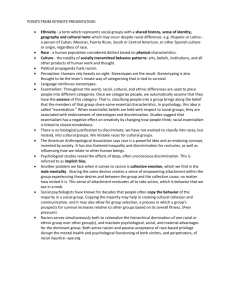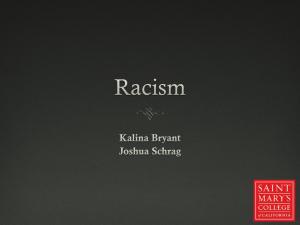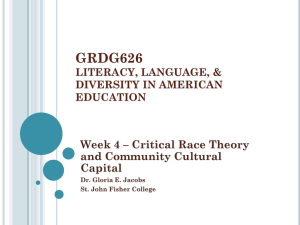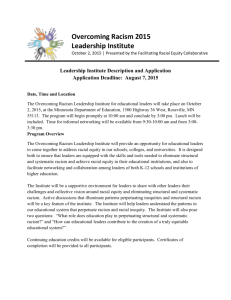RFP-7-3-13 - Overcoming Racism
advertisement
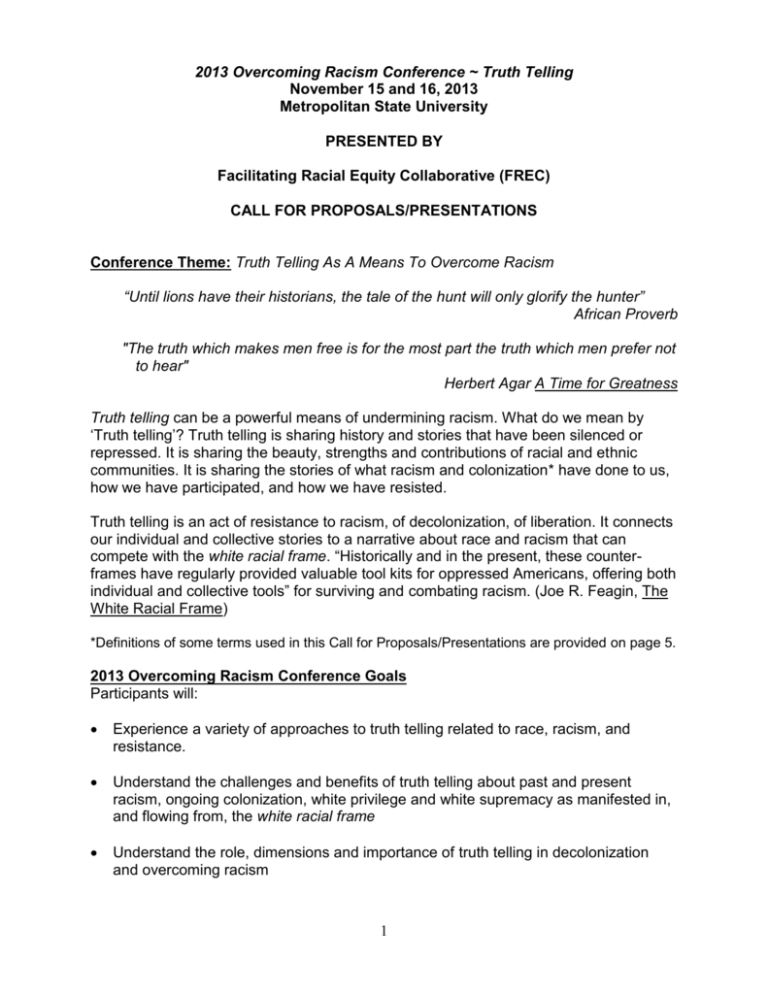
2013 Overcoming Racism Conference ~ Truth Telling November 15 and 16, 2013 Metropolitan State University PRESENTED BY Facilitating Racial Equity Collaborative (FREC) CALL FOR PROPOSALS/PRESENTATIONS Conference Theme: Truth Telling As A Means To Overcome Racism “Until lions have their historians, the tale of the hunt will only glorify the hunter” African Proverb "The truth which makes men free is for the most part the truth which men prefer not to hear" Herbert Agar A Time for Greatness Truth telling can be a powerful means of undermining racism. What do we mean by ‘Truth telling’? Truth telling is sharing history and stories that have been silenced or repressed. It is sharing the beauty, strengths and contributions of racial and ethnic communities. It is sharing the stories of what racism and colonization* have done to us, how we have participated, and how we have resisted. Truth telling is an act of resistance to racism, of decolonization, of liberation. It connects our individual and collective stories to a narrative about race and racism that can compete with the white racial frame. “Historically and in the present, these counterframes have regularly provided valuable tool kits for oppressed Americans, offering both individual and collective tools” for surviving and combating racism. (Joe R. Feagin, The White Racial Frame) *Definitions of some terms used in this Call for Proposals/Presentations are provided on page 5. 2013 Overcoming Racism Conference Goals Participants will: Experience a variety of approaches to truth telling related to race, racism, and resistance. Understand the challenges and benefits of truth telling about past and present racism, ongoing colonization, white privilege and white supremacy as manifested in, and flowing from, the white racial frame Understand the role, dimensions and importance of truth telling in decolonization and overcoming racism 1 Gain practical skills and tools for truth telling, for facilitating difficult conversations about race and racism, and for challenging institutional racism in their own life contexts Explore the unique challenges, possibilities and practical application of truth telling and overcoming racism skills and tools in their particular settings Keynotes Friday morning: Brotherhood, Inc. works to break the devastating cycles of poverty, unemployment, and incarceration facing young African American males in the twin cities, ages 16-24, who have had contact with the criminal justice system or gangs, or who are at risk of such involvement. Their comprehensive reentry and prevention program takes a holistic approach to empowerment by providing culturally-sensitive social services, educational opportunities and on-site employment for participants through the creation of social enterprises. Participants take part in life skills development activities and gain knowledge in areas such as financial literacy, stress management, racial justice, fitness and wellness, self advocacy and empowerment, African Americans and the Law, and cultural development through the arts. Participants are employed through Brotherhood Brew, a social enterprise that offers fresh, organic, fair trade coffee, tea, and hot cocoa for sale to individuals, businesses, non-profit organizations, churches, educational institutions and government entities. Through employment at Brotherhood Brew, participants gain an array of small business and customer services skills and build upon existing strengths in teamwork and leadership. Through their original theatrical and spoken word performance The Forgotten, A Look at the Lives of Young Black Men, participants of the program provide a unique window into their lives as they strive to overcome adversity and rise above the infrastructures that impact their lives. Saturday morning: Diane Wilson, Mdewakanton descendant, is an award-winning author, writer and gardener. Her essays and memoirs use personal experiences to illustrate broader social and historical context. Ms Wilson’s first book, Spirit Car: Journey to a Dakota Past, won the 2006 Minnesota Book Award for Memoir, Autobiography, and Creative Nonfiction. Her second book, Beloved Child: Dakota Way of Life was released in 2011. It is a collection of personal stories and has received awards from the Jerome Travel & Study program, the Minnesota State Arts Board, Ragdale Artist Residency, and the Hedgebrook Residency for Women Writers. Ms Wilson is the Executive Director of Dream of Wild Health, a native owned 10-acre farm in Hugo, MN. A master gardener, she maintains a large butterfly garden filled with native plants. She is a member of the Dakota Kiciya and helps organize the Dakota Commemorative Marches on the Lower Sioux reservation. 2 Call for Workshop Proposals Proposals are invited for workshops addressing the conference theme and goals above. Workshops will be offered both days of the conference in breakout sessions lasting 90 minutes each. You may also propose an extended workshop lasting 3 hours (two 90 minute sessions with a break between.) While you are welcome to have as many presenters as you wish, a maximum of 2 free full conference registrations will be offered to presenters per workshop selected. To propose a workshop, please use the online form at https://docs.google.com/spreadsheet/viewform?formkey=dEYtSXhuc2RWM01iX3ZKYk NYdG8zY1E6MA#gid=0 (You may need to copy the link and paste into your browser.) You will be asked to enter the information outlined on the next page. Or you may send your proposal, following the format on the next page, by mail or email as indicated. Proposals must be received by 5:00 pm on Tuesday, September 3rd, 2013. All submitted proposals will be reviewed by the Conference Program committee, and a decision will be communicated to the indicated contact person by September 17, 2013. Your proposed workshop should explicitly address truth telling as a means to overcome racism, and be consistent with one or more of the goals of the Overcoming Racism 2013 conference (above.) Below are some examples of relevant types of workshops and/or workshop themes. Please note that this list is illustrative, not exhaustive: Truth Telling in Anti-Racism Work: Strategies and Examples Histories and Stories of the Indigenous Peoples in Minnesota Histories and Stories of Racial and Ethnic Communities in Minnesota Histories and Stories of Resistance to Racism and Decolonization Settler Colonialism, Settler Mindset and Contested Histories Whose Version of History? Whose Truth? ‘Expanding the Narrative’ as a Critical Element of Overcoming Racism Artistic Expressions and Approaches That Support and Enable Truth Telling Methods For Bringing Truth Telling to Daily Interactions and Contexts 3 Workshop Proposal Format 1. Workshop Title: 2. Workshop Learning Objectives for Participants (should support/be in alignment with one or more Conference Goals): 3. Workshop Description, 50 words or less, for printed Conference Program: 4. Additional Workshop Description, up to 200 words, for Program Committee use in workshop selection: 5. Ideal number of workshop participants, choose one or more ranges: ____ 1-15 ____ 15-30 ____ 30-50 6. Name of each presenter(s) with title and/or organizational affiliation for printed Conference Program: 7. Presenter(s) Description, 50 words or less, for Conference Website: 8. Proposed Workshop Length, choose one: ___ 90 minutes ___3 hours 9. Would you be willing to present a seven minute talk at the conference summarizing the key ideas of your workshop? ___ Yes ___ No 10. Audio-visual needs: Choose all that apply ___ LCD projector ___ Audio/speakers ___ Overhead projector ___ None at all ___ DVD player ___ Other: Note: We suggest you bring A/V content on disc or USB drive, rather than bringing a laptop. All workshop rooms have white boards and markers. If you need chart paper or handouts, you will be responsible for supplying them. 11. Contact Person Name: Phone: Email: Submit proposals in or attached to an email addressed to: proposals@overcomingracism.org or via mail to: Overcoming Racism Workshops Cherokee Park United Church 371 West Baker Street Saint Paul, MN 55107 Deadline: Proposals must be received by 5 pm on Tuesday, September 3rd, 2013 (Acceptance of proposals will be confirmed by September 17th, 2013.) 4 Definitions Colonialism is a political-economic phenomenon whereby various European nations and the United States invaded, conquered, settled, and exploited large areas of the world. The purposes of colonialism included economic exploitation of the colony's natural resources, creation of new markets for the colonizer, and extension of the colonizer's way of life beyond its national borders. (www.answers.com/topic/colonialism) Typical aspects of colonialism include: racial and cultural inequality between ruling and subject people, political and legal domination by the imperial power, and exploitation of the subject people. (www.answers.com/topic/colonization) Colonization occurs when one people is conquered by another people through destroying and/or weakening basic social structures in the conquered culture and replacing them with those of the conquering culture. Colonization robs the colonized of most of their land and resources. Loss of the land base means loss of the foundation for their traditional social, economic and cultural ways of life. Colonization robs the colonized of their cultural inheritance. Colonizers view and treat the colonized as lesser human beings; this leads to stigmatization, shame, and sense of worthlessness. (Bill Mussell, member of Skwah First Nation, “Cultural Paths for Decolonization.” http://www.heretohelp.bc.ca/publications/aboriginal-people/bck/2) Decolonization is the undoing of colonialism. It can be understood politically (political independence, regaining control over land or territories) and culturally (undoing of pernicious colonial effects, especially psychological injury.) White Privilege An invisible package of unearned assets given to white people based on race. "I was taught to see racism only in individual acts of meanness, not in invisible systems conferring dominance on my group" Peggy McIntosh: White Privilege: Unpacking the Invisible Knapsack White Racial Frame Since its development in the 17th century, this racial frame has been a “master frame,” a dominant framing that provides a generic meaning system for the racialized society that became the United States. The white racial frame provides the vantage point from which European American oppressors have long viewed North American society. In this racial framing, whites have combined racial stereotypes (the cognitive aspect), metaphors and interpretive concepts (the deeper cognitive aspect), images (the visual aspect), emotions (feelings), and inclinations to discriminatory action. This frame buttresses, and grows out of the material reality of racial oppression. The complex of racial hierarchy, material oppression, and the rationalizing white racial frame constitute what I term systemic racism. This white racial frame includes much more than the usual concepts we use in the study of racial matters, such as stereotyping and prejudice or discrimination. (Feagin, Joe R. 2006. Systemic Racism: A Theory of Oppression. New York, NY: Routledge) 5

